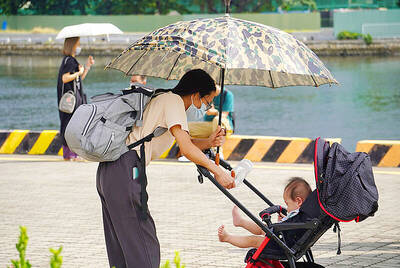Officials and foreign dignitaries at a workshop in Taipei yesterday underlined the importance of combating disinformation by improving media literacy, a task they said is best achieved through collaborations between the public and private sectors on cultivating a citizenry and civic society that engage in critical thinking and consciously fact-checks information.
The workshop — held as part of the Global Cooperation and Training Framework established by Taipei and Washington — was organized by the Ministry of Foreign Affairs, the American Institute in Taiwan (AIT) and the Taiwan Foundation for Democracy (TFD).
The event was attended by US Deputy Assistant Secretary Scott Busby, AIT Director Brent Christenson, Minister of Foreign Affairs Joseph Wu (吳釗燮), Minister Without Portfolio Audrey Tang (唐鳳), Legislative Speaker Su Jia-chyuan (蘇嘉全), who is also the chairman of the TFD, and representatives from 12 other nations.
Speaking at the workshop’s opening ceremony at the TFD’s office, Wu said that while disinformation disseminated by non-democratic actors to sow discord in society poses a threat to democracies worldwide, it also presents an opportunity for them to build a society based on a better informed and more educated citizenry.
Taiwan is constantly suffering from “coordinated attacks” of disinformation, whether they originate domestically or externally, Wu said.
While some have suggested that government efforts to combat disinformation are aimed at fending off tough questions, Wu said that the two issues are fundamentally different.
“Criticism of the government can take many shapes and forms, and it is our job — as an administration rooted in our fight for democracy — to ensure that this freedom is not only respected, but also enshrined as part of our society, but when this criticism is based on fake information and falsehoods, when it is based on unsourced and anonymous material, and when it comes coordinated from foreign actors that hold a vested interest in degrading our political system, that is when it becomes our responsibility to counter it,” Wu said.
As an example of externally generated disinformation, Wu said that there had been widespread media reports about a foreign minister of one of the nation’s diplomatic allies visiting Beijing and being about to shift diplomatic recognition, adding that the news worried the ministry, which immediately contacted the its ambassador to the country in question.
Within a few hours, the “news” had been disproved, Wu said, after the ambassador sent back a photograph of himself and the foreign minister of the diplomatic ally taken in the capital of that country.
“As it turned out, this rumor originated from a social media account based in China’s Hebei Province,” he said.
While the Executive Yuan has set up a Web page for real-time clarification of fake or misleading news, the advent of new technology has often meant the spread of disinformation is faster than the government can clarify it, which is why efforts by civic society are required when countering disinformation, he said.
“While China might pay netizens 50 cents to post fake information, it costs us much more than that to rebut it,” he said.
Organizations like the non-profit Taiwan FactCheck Center are working to verify news and information collected online and via social media, Wu said, but in the long term, the economics of disinformation dictate a need for a better approach, one that must be centered not on the government, but the very people that produce and consume information: journalists, academia and all citizens.
Busby said that a “determined external actor with hostile intentions” — the Chinese Communist Party (CCP) -— could place enormous strain on Taiwan’s democratic institutions.
Quoting from a speech by US Vice President Mike Pence, Busby said that the CCP has similarly sought to shape the US information environment by rewarding or coercing US businesses, movie studios, universities, think tanks, academics, journalists, as well as local, state and federal officials.
While governments have a particularly important role in collecting and denouncing such “hostile” actors and shining a light on their often hidden agenda, collaborative efforts by all stakeholders — including the media, non-governmental organizations, and private companies — are required to successfully counter disinformation, he said.
As disinformation campaigns often seek to exploit the openness and freedom of democratic societies, some people have come to doubt the accuracy of their sources of news, which poses a challenge even to fact-based, traditional media outlets, he said.
In this context, it is crucial for the government to support efforts to develop resilience against disinformation in people and institutions, promote healthy and robust public debates based on facts, evidence and reason, and boost effective civic engagement, he said, adding that the promotion of media literacy would be key to achieving these goals.
The spread of disinformation by foreign actors does not just pose challenges for Taiwan, but also for the US, in particular in the lead-up to its midterm elections next month, Christenson said.
He said that media literacy is built upon the foundation of critical thinking, which helps people fulfill their civic duties and is something that all consumers of information should engage in, as a well-informed citizenry that can effectively distinguish between credible and false reports is one that is less prone to group-think and more able to solve complex challenges.

Taiwanese Olympic badminton men’s doubles gold medalist Wang Chi-lin (王齊麟) and his new partner, Chiu Hsiang-chieh (邱相榤), clinched the men’s doubles title at the Yonex Taipei Open yesterday, becoming the second Taiwanese team to win a title in the tournament. Ranked 19th in the world, the Taiwanese duo defeated Kang Min-hyuk and Ki Dong-ju of South Korea 21-18, 21-15 in a pulsating 43-minute final to clinch their first doubles title after teaming up last year. Wang, the men’s doubles gold medalist at the 2020 and 2024 Olympics, partnered with Chiu in August last year after the retirement of his teammate Lee Yang

FALSE DOCUMENTS? Actor William Liao said he was ‘voluntarily cooperating’ with police after a suspect was accused of helping to produce false medical certificates Police yesterday questioned at least six entertainers amid allegations of evasion of compulsory military service, with Lee Chuan (李銓), a member of boy band Choc7 (超克7), and actor Daniel Chen (陳大天) among those summoned. The New Taipei City District Prosecutors’ Office in January launched an investigation into a group that was allegedly helping men dodge compulsory military service using falsified medical documents. Actor Darren Wang (王大陸) has been accused of being one of the group’s clients. As the investigation expanded, investigators at New Taipei City’s Yonghe Precinct said that other entertainers commissioned the group to obtain false documents. The main suspect, a man surnamed

US Secretary of the Treasury Scott Bessent and US Trade Representative Jamieson Greer began talks with high-ranking Chinese officials in Switzerland yesterday aiming to de-escalate a dispute that threatens to cut off trade between the world’s two biggest economies and damage the global economy. The US delegation has begun meetings in Geneva with a Chinese delegation led by Chinese Vice Premier He Lifeng (何立峰), Xinhua News Agency said. Diplomats from both sides also confirmed that the talks have begun, but spoke anonymously and the exact location of the talks was not made public. Prospects for a major breakthrough appear dim, but there is

The number of births in Taiwan fell to an all-time monthly low last month, while the population declined for the 16th consecutive month, Ministry of the Interior data released on Friday showed. The number of newborns totaled 8,684, which is 704 births fewer than in March and the lowest monthly figure on record, the ministry said. That is equivalent to roughly one baby born every five minutes and an annual crude birthrate of 4.52 per 1,000 people, the ministry added. Meanwhile, 17,205 deaths were recorded, resulting in a natural population decrease of 8,521, the data showed. More people are also leaving Taiwan, with net